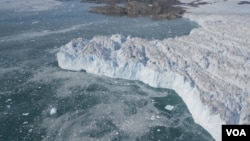Despite warnings by climate scientists that the massive Greenland ice sheet is melting rapidly into the sea, researchers in Denmark say that scenario is far from certain. Their new study of Greenland’s glacial ice sheet reports that twice in the past 30 years, major melting events have been followed by periods when melting stopped and the ice sheet stabilized.
The authors say the rapid melting that has made headlines in recent weeks also is likely to slow or stop. Their conclusion also contradicts widely-reported predictions that the accelerating ice melt will trigger a significant rise in global sea levels.
The Danish study, published this week in the journal Science, documents changes in the Greenland ice sheet before the year 2000 by combining contemporary satellite data with old aerial photographs. Co-author Shfaqat Abbas Khan, an earth scientist at Denmark Technical University, said his team is the first to show recent periods of ice sheet loss that slowed and then stopped, rather than continuing or speeding up.
The researchers say a longer and more detailed record of Greenland’s past is needed to better predict the future of the glacier-covered landmass.
“These variations in the amount of thinning that we are able to document since the [19]80s make it difficult to predict how much the world’s oceans will rise over a longer period of time - a century for instance - as a result of Greenland glacial melt-water runoff,” says geologist and co-author, Kurt Kjaer of the Denmark Natural History Museum.
He believes that many of the computer models predicting ice sheet behavior, though, are based on short-term data since 2000 and must be reassessed. "It is too early," Kjaer adds, "to proclaim the ice sheet’s future doom.”
The authors say the rapid melting that has made headlines in recent weeks also is likely to slow or stop. Their conclusion also contradicts widely-reported predictions that the accelerating ice melt will trigger a significant rise in global sea levels.
The Danish study, published this week in the journal Science, documents changes in the Greenland ice sheet before the year 2000 by combining contemporary satellite data with old aerial photographs. Co-author Shfaqat Abbas Khan, an earth scientist at Denmark Technical University, said his team is the first to show recent periods of ice sheet loss that slowed and then stopped, rather than continuing or speeding up.
The researchers say a longer and more detailed record of Greenland’s past is needed to better predict the future of the glacier-covered landmass.
“These variations in the amount of thinning that we are able to document since the [19]80s make it difficult to predict how much the world’s oceans will rise over a longer period of time - a century for instance - as a result of Greenland glacial melt-water runoff,” says geologist and co-author, Kurt Kjaer of the Denmark Natural History Museum.
He believes that many of the computer models predicting ice sheet behavior, though, are based on short-term data since 2000 and must be reassessed. "It is too early," Kjaer adds, "to proclaim the ice sheet’s future doom.”





